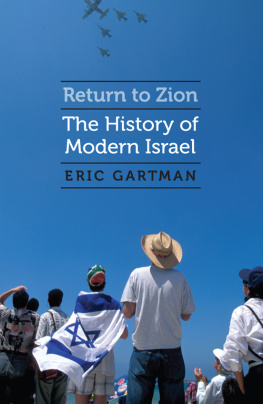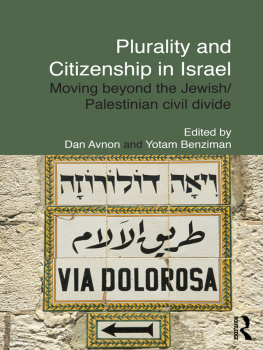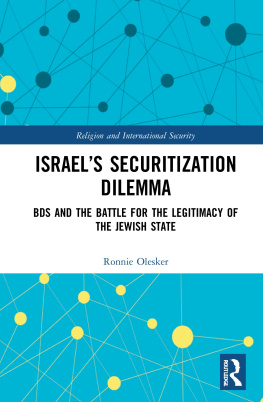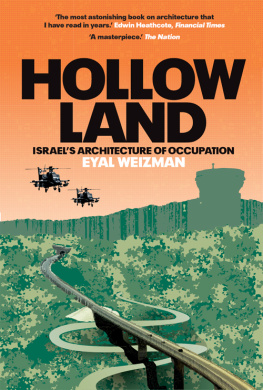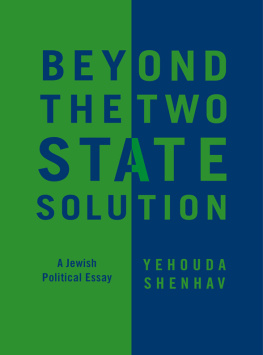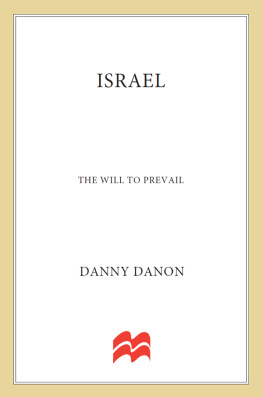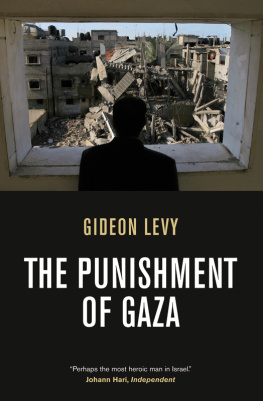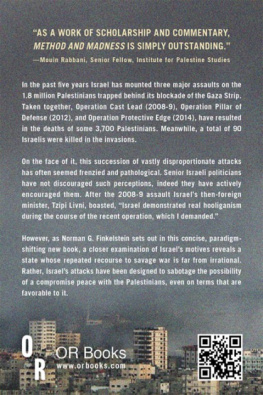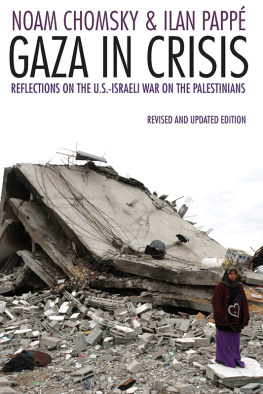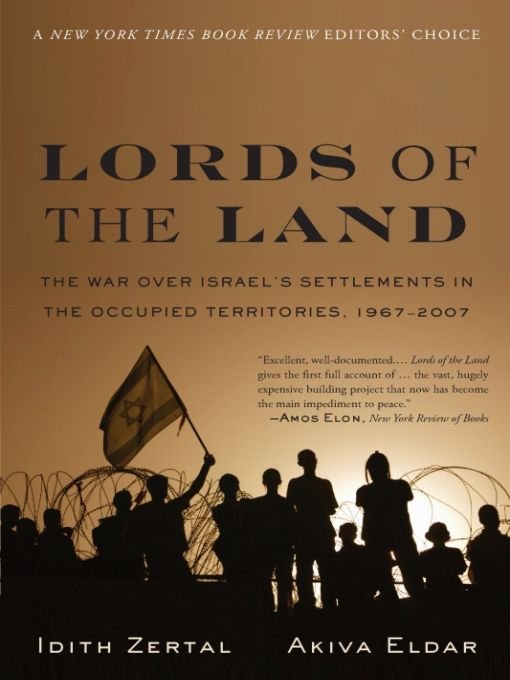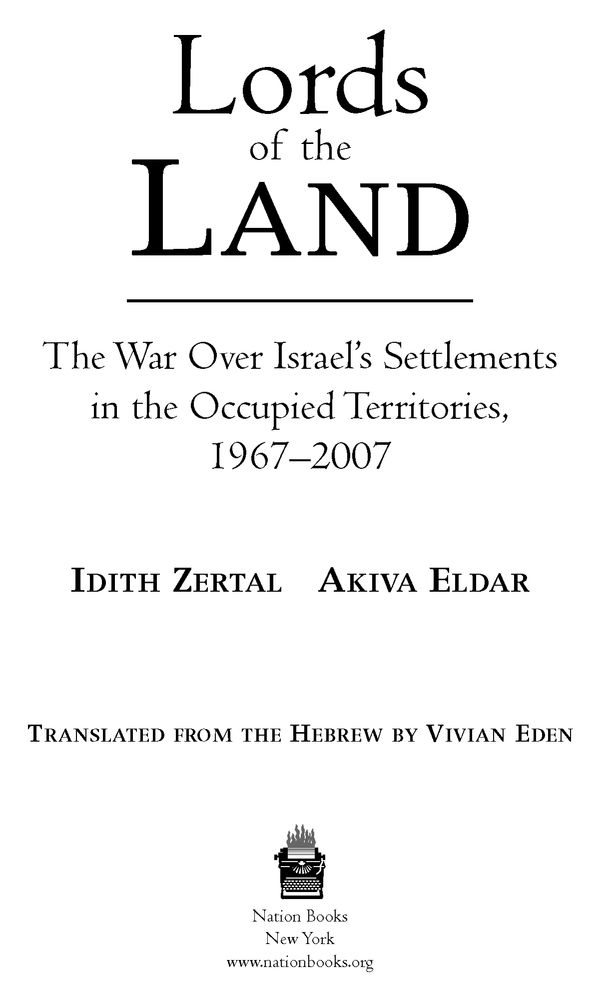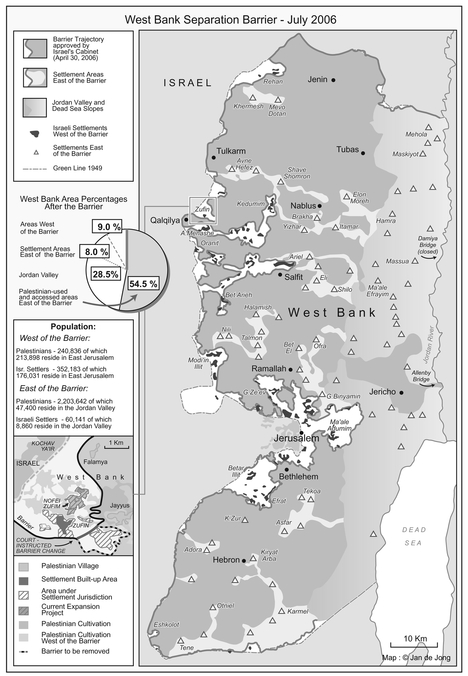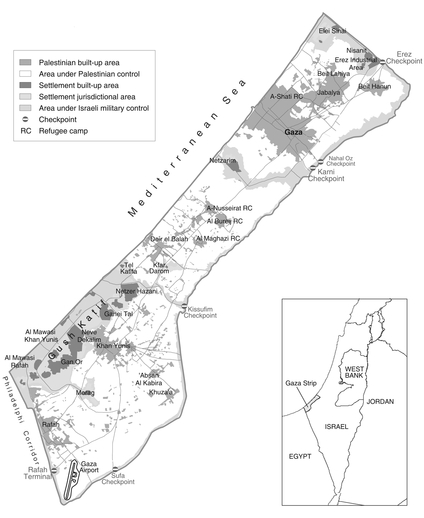Table of Contents
Courtesy of the Foundation for Middle East Peace http://www.fmep.org Mapmaker: Jan de Jong
The Gaza Strip
Courtesy of BTselem (The Israeli Information Center for Human Rights in the Occupied Territories) http://www.btselem.org/ UNs OCHA
Introduction
From a light plane flying over the West Bank, the view is beautiful. Stretching from the lush green of Samaria in the north, southward toward Jerusalem and over the yellowing Judean Hills that slope eastward down to the Jordan River and the Dead Sea, the landscape modulates from Tuscan green to stony gray to desert. It is, from this height at least, a land of few people and much scenery. Small aggregates of life, like interlinked clusters of grapes or beehives, nestle in a valley or clamber up a hillside, strewn in clumps over wide empty spaces. White roads and shiny asphalt highways carved into the chalky rock extend from one settled hive to another.
As the Cessna flies at a lower altitude, greater details emerge. Brown wooden houses, red-tiled roofs, and here and there a blue splash of swimming pool in the midst of luxuriant foliage almost mingle with the small, light-colored stone cubes crowded around the tall minaret of a mosque, surrounded by expanses of wheat fields and olive groves. And then suddenly, as if out of nowhere, a larger place materializes: a town, a pile of houses jumbled together with no discernible logic, climbing and descending a mountainside and surrounded by rocky land or cultivated groves.
But beneath the serene, colorful picture seen from the window of the cruising Cessna, the ideological grid of the territories reveals itself, as in an old and faded painting in which the layers of color on the canvas peek through and tell their story. This is the outline of the grand plan of the Jewish presence that determines the configurations and the reality on the ground. Gradually the subtext is exposed and the drama of the Jewish settlers state, of the Israeli occupation, of the destruction and plunder, and of the lawbreaking unfolds in the deceptive landscape. The seemingly random patches of Jewish settlement become more meaningful, part of the pattern of renewed Jewish possession of the land of the Fathers, at the expense of millions of Palestinians and of the wholeness of the Palestinian national body.
Four decades have passed since the 1967 war, after which Jewish citizens of Israel began to settle beyond the border of their state in contravention of international law, which prohibits an occupying state from transferring population into occupied territory. For approximately two-thirds of its history, Israel has been an occupying state. The State of Israel has been free of the malignancy of occupation for only nineteen of the fifty-nine years of its existence. The vast majority of the 7 million Israelis do not know any other reality. The vast majority of the 4 million Palestinians who live under occupation do not know any other reality. The prolonged military occupation and the Jewish settlements that are perpetuating it have toppled Israeli governments and brought Israels democracy and its political culture to the brink of an abyss. They have transformed the very foundations of Israeli society, economy, army, history, language, moral profile, and international standing. A state that emerged out of the catastrophe of the destruction of European Jewry, and from it drew the legitimacy for the means of its establishment and for the very fact of its existence, is being crushed from within and is increasingly the subject of bitter controversy abroad because of the settlements.
When this book was first published in Hebrew, in early 2005, the Israeli proposal for disengagement from the Gaza Strip and the dismantling of the Jewish settlements there was still a raw idea within a foggy thicket of unknown and unexpected factors. Yet another of the grandiose unilateral acts designed by Ariel Sharon, Israels prime minister from 2001 to 2006, the disengagement plan led to a confrontation between the concepts of the State of Israel (the political, legal, and civic entity established and internationally recognized in 1948) and the Land of Israel, or Eretz Yisrael (the embodiment of millenarian, religious, and national aspirations and myths), and between their historical representatives, and seemingly threatened to break Israeli society in two. The most extreme members of the settler community have long declared the nullity of the State of Israel and of Israeli democracy, while most of them have vowed uncompromising resistance to what they see as the destruction of the Home (Hurban HaBayit, or Temple). However, despite the harsh scenes of collective hysteria, and the Judgment Day threats that went along with it, the actual disengagement, carried out in August 2005, has already nearly sunk into historical oblivion. To a large extent it was the settlers themselves who paid for their repeated apocalyptic prophecies and their going to the brink too many times. There is a limit to the catastrophic traumas that the overflowing collective Israeli memory can contain.
The disengagement operation seemed to some like the start of a new era in relations between Israel and the Palestinians: a first step in the painful and lengthy process of undoing the settlement project and Israels return to the 1949-1967 borders. This was more wishful thinking than anything else. Others saw it as no more than yet another of Sharons cunning and brilliant maneuvers, of sacrificing the handful of indefensible settlements in the Gaza Strip for the sake of winning the greater campaign for control of the West Bank and the settlements that Sharon himself had sown there. As for the settlers, who since the very beginning have been fighting for every house and every outpost they built on every godforsaken hill as though it were a replica of the Temple, and as if each one of them held the secret of their being and its raison dtrethey saw the disengagement as a kind of world war of Holocaust-like dimensions. In Sharons unexpected collapse into a deep coma, which occurred just a few months after the destruction of the Gaza settlements, the settlers were able to see, with the spiritual guidance of their rabbis, a divine punishment of someone who dared to challenge them and their God.
Insofar as can be asserted today, Israels withdrawal from Gaza was none of these. It did not inaugurate a new era of Israeli withdrawal from the occupied territories, it did not ensure the settlements in the West Bank, and it did not bring Sharons punishment down on him. Nor did it release Gaza for even a single day from Israels military grip or from the price of the occupation that its inhabitants pay every day, nor did it bring quiet and security to the communities on the southwestern border of Israel, or even to its other borders. It gave rise only to more hatred, more destruction, and more hopelessness.
Under cover of the uproar over the disengagement, followed by the political upheavals in Israel that derived from it and then by the second Lebanon War in the summer of 2006, the settlement fever and all it involves continues. Almost out of sight and out of mind, it is going on with the full cooperation of the State of Israel and its institutions, as though it were an involuntary, unconsidered movement of a body that has lost its mind. Tenders for building new neighborhoods in the settlements, mainly in the Greater Jerusalem area, continue to be published, and new houses are rising steadily. In 2005 alone construction began on 1,666 housing units in the West Bank. The number of Jewish settlers beyond the Green Line, which was long ago erased from Israels textbooks and many of its history books, continues to rise at a steady rate. At the end of 2006 the number of settlers stood at 270,000 (to this number should be added some 220,000 settlers living in neighborhoods surrounding Jerusalem, beyond the Green line), and since the withdrawal from Gaza nearly 20,000 new settlers have been added in the West Bank. Two-thirds of them were babies born in the settlements and the rest were newcomers, from Israel or other countries.


